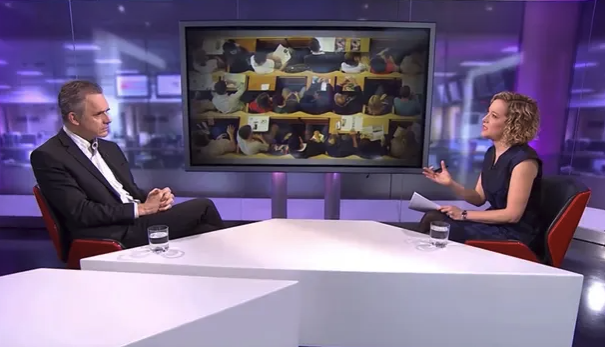The Government’s announcement that they will privatise Channel 4 has led to predictable howls of outrage from the Left, with comparisons to Orban, while free marketeers on the Right have welcomed the sale of an institution set up by Thatcher.
Both sides may be thinking largely of Channel 4 News, which has attracted controversy over its perceived Left-wing bias. Infamously presenter Jon Snow was reprimanded for supposedly chanting “F**k the Tories” at Glastonbury while in 2019 the studio audience booed when exit polls predicted a Conservative election victory.
However, Channel 4’s problems go far beyond that. Although live TV still accounts for a majority of viewing, over 60% of households now have a streaming service and increasingly large numbers of young people don’t watch live TV or even own a television.
At the same time Channel 4’s original output has declined. In 2016 they bragged of a £92 million spend on films but only commissioned three themselves. The rest were Hollywood buy-ins. That same year 35% of Channel 4 programmes and 90% of E4’s were acquisitions rather than original commissions.
Their public service remit has also suffered, with increasingly few programmes on religion, education, or the regions. Their schedule this Saturday consists of a documentary about Prince Phillip, two farming shows, and a film about British royalty. It’s a long way from the days when they’d commission a four-hour adaptation of an obscure Shelley novel.
To some degree this was inevitable, as audiences have fractured to watch new channels. But will privatisation help?
Although some have said that the privatisation might be “payback” for their Left-wing bias, it’s unlikely that will change. If anything, it’s likely to get worse, as the Government will no longer have a veto on the board’s membership or be able to control their finances or terms of operation. Channel 4 was already profitable, so the temptation will be to lean even further into their pre-existing Left-wing audience, as polemical television in the USA has done.
Supporters also argue that privatisation will help them raise capital and compete against streamers like Netflix or Amazon. But the streaming market is already so over-saturated that when giant Paramount announced a $6 billion investment into their new service their stock actually dropped 20%.
Rather than trying to compete with streaming services, Channel 4 should copy South Korea and produce programmes for streamers to acquire. Huge investment in culture has led to the global phenomenon of K-Pop, while on Netflix Korean-origin programming was the second most watched, with 4.3 billion hours. Britain came in third, with 2.2 billion hours watched.
The Koreans went from being a cultural non-entity to persuading people to watch dramas about obscure Joseon dynasties, culminating in hits like zombie-historical epic Kingdom or the science-fiction thriller Squid Game, which was Netflix’s most watched show of all time.
They did so by producing at scale for a global audience. British dramas are reliant on an old-fashioned commissioning system where a handful of people choose what to make, resulting in artisanal one-off series. Instead, the Koreans prefer longer series which can reuse sets, keeping costs down, and with limited nudity or other adult content, they can be watched even in Saudi Arabia. With so many programmes produced, there is an intense competition for viewers, which has led to more high quality and creative programming.
The Vaccine Taskforce showed how successful a venture capitalist model for government could be. Rather than privatise Channel 4, the government should seek to replicate that success, with a high-powered outsider given the remit to imitate Korea and make Britain the most successful producer of high-quality programmes for streaming services.










Join the discussion
Join like minded readers that support our journalism by becoming a paid subscriber
To join the discussion in the comments, become a paid subscriber.
Join like minded readers that support our journalism, read unlimited articles and enjoy other subscriber-only benefits.
Subscribe